九年级英语上册Unit6 TV programmes Period3 Grammar上课课件(共36张PPT)牛津译林版
文档属性
| 名称 | 九年级英语上册Unit6 TV programmes Period3 Grammar上课课件(共36张PPT)牛津译林版 | 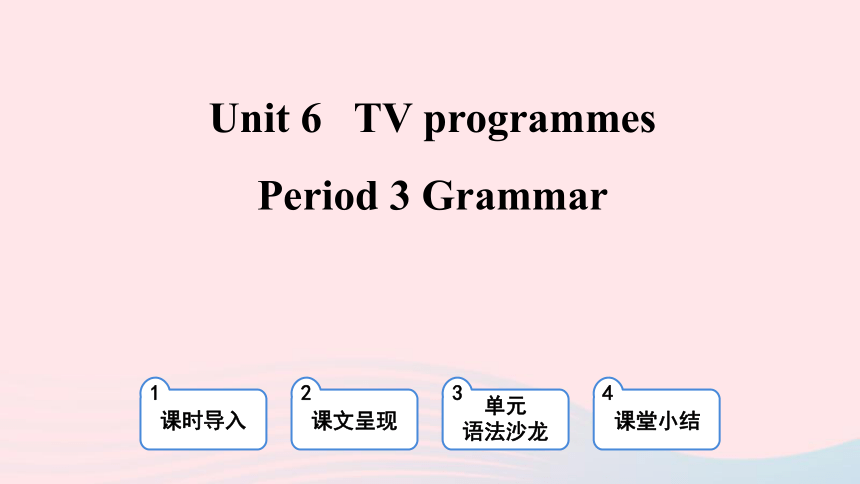 | |
| 格式 | pptx | ||
| 文件大小 | 3.1MB | ||
| 资源类型 | 教案 | ||
| 版本资源 | 牛津译林版 | ||
| 科目 | 英语 | ||
| 更新时间 | 2025-02-16 11:08:49 | ||
图片预览

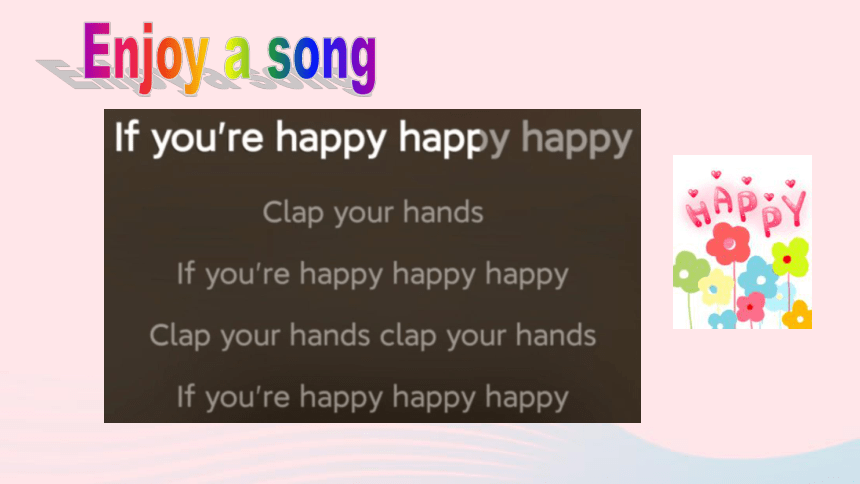




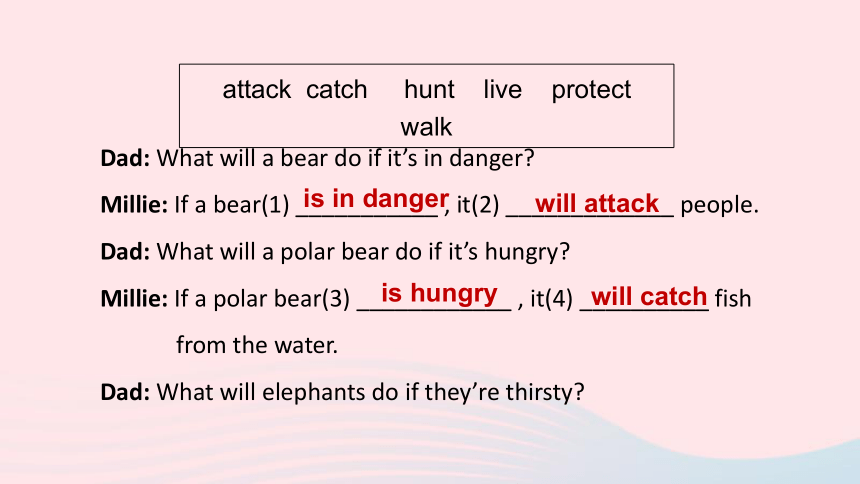
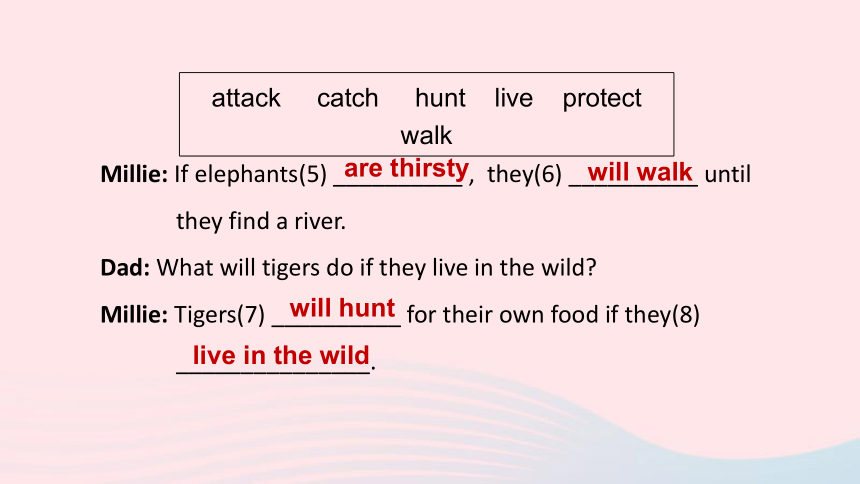
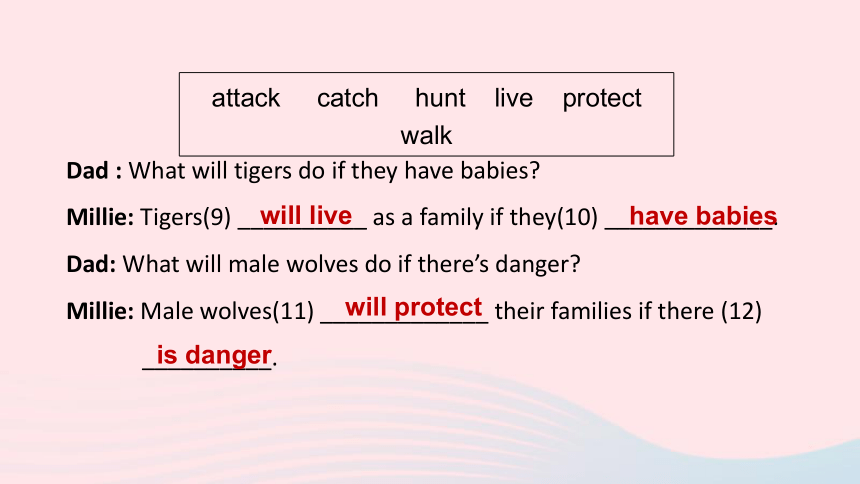
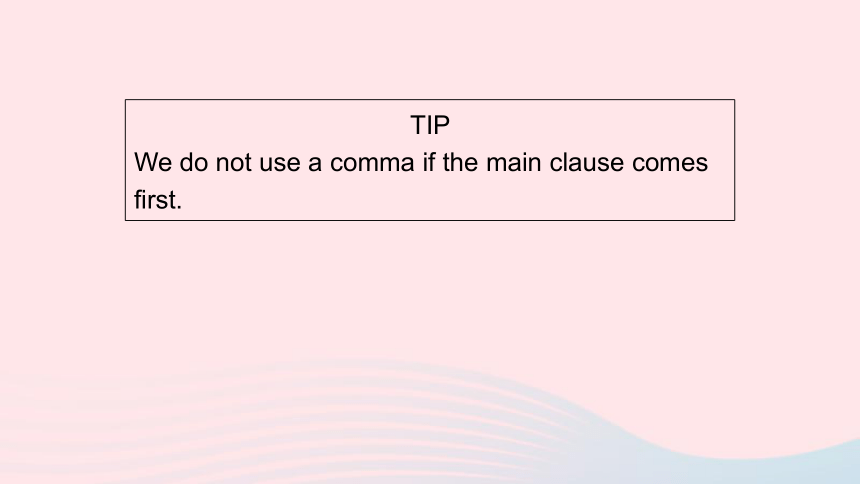
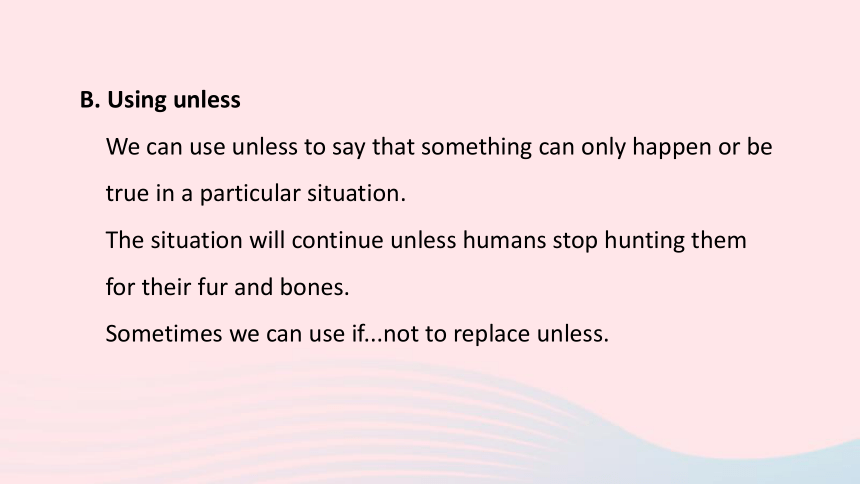
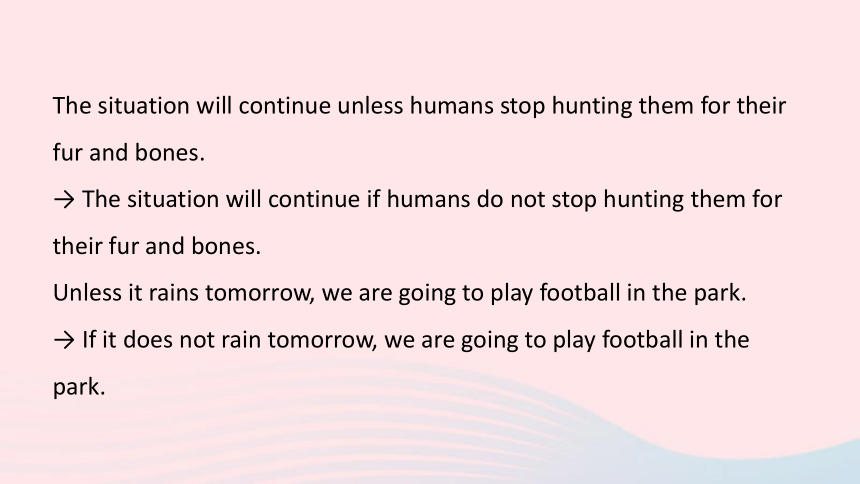
文档简介
(共36张PPT)
Unit 6 TV programmes
Period 3 Grammar
1
课时导入
2
课文呈现
3
单元
语法沙龙
4
课堂小结
Enjoy a song
A. Using if
We use if to talk about the result of a possible action. We make sentences with if like this:
TIP
We put a comma after the if-clause when it is the first part of a sentence.
If-clause (simple present tense) Main clause (will/may/might/...+infinitive)
If you are a football fan, you will not want to miss this week’s programme.
If you are an animal-lover, you may feel sad about it.
If you enjoy solving mysteries, you might like this film.
1. If I(go, will go) to the Reading Club this afternoon, I(do not have, may not have) any time to watch TV.
2. If Simon(gets, will get) home too late, he(misses, will miss) his favourite cartoon.
3. If Amy(completes, will complete) all her homework quickly, she(watches, will watch) the chat show.
√
√
√
√
√
√
4. If Daniel(takes, will take) part in the game show, he(wins, might win) a prize.
5. If Sandy(finds, will find) a programme interesting, she (introduces, will introduce) it to us.
√
√
√
√
Dad: What will a bear do if it’s in danger
Millie: If a bear(1) ___________ , it(2) _____________ people.
Dad: What will a polar bear do if it’s hungry
Millie: If a polar bear(3) ____________ , it(4) __________ fish from the water.
Dad: What will elephants do if they’re thirsty
attack catch hunt live protect walk
is in danger
will attack
is hungry
will catch
Millie: If elephants(5) __________ , they(6) __________ until they find a river.
Dad: What will tigers do if they live in the wild
Millie: Tigers(7) __________ for their own food if they(8) _______________.
attack catch hunt live protect walk
are thirsty
will walk
will hunt
live in the wild
Dad : What will tigers do if they have babies
Millie: Tigers(9) __________ as a family if they(10) _____________.
Dad: What will male wolves do if there’s danger
Millie: Male wolves(11) _____________ their families if there (12) __________.
attack catch hunt live protect walk
will live
have babies
will protect
is danger
TIP
We do not use a comma if the main clause comes first.
B. Using unless
We can use unless to say that something can only happen or be true in a particular situation.
The situation will continue unless humans stop hunting them for their fur and bones.
Sometimes we can use if...not to replace unless.
The situation will continue unless humans stop hunting them for their fur and bones.
→ The situation will continue if humans do not stop hunting them for their fur and bones.
Unless it rains tomorrow, we are going to play football in the park.
→ If it does not rain tomorrow, we are going to play football in the park.
The unless-clause can come first or after the main clause.
Unless you try your best, you will not realize your dream.
You will be late unless you leave right now.
a. unless you take your own food with you.
b. you will not need to take the minibus in the studio.
c. you will not have to take an umbrella with you.
d. unless the traffic is very heavy.
e. unless you have little interest in it.
f. you will travel around it with a tour guide.
1. Unless the weather report says it is going to rain, ________
2. We will arrive at the studio around 9:30 a.m. _______
3. Unless you already know the studio very well, _______
4. You will buy your lunch at the restaurants in the studio____
5. Unless you are tired, _______
6. You will have a chance to see how a TV programme is recorded _______
c
d
b
a
f
e
Work out the rule!
We use the simple(future, present) tense in the unless-clause.
if、unless 引导的条件状语从句
if、unless 引导的条件 状语从句 概述 条件状语从句表示主句动作发生的条件, 在初中阶段常由if (如果) 引导, 表示“假如有从句的动作发生, 就会有主句的动作发生”。①
if 引导的条件状语从句 时态:主将从现、主祈从现、主情从现②
位置:从句可以位于主句之前, 也可以位于主句之后。不过从句在前时, 主从句之间须用逗号隔开。③
if 还可引导宾语从句, 意为“是否”。④
if、unless 引导的条件 状语从句 unless 引导的 条件状语从句 unless 引导条件状语从句, 相当于if 引导的条件状语从句的否定形式, 即unless=if...not。中文意为“如果不……;除非”。⑤
unless 引导的条件状语从句要用一般现在时表示将来。⑥
e.g. Please call me if he is at home.
假如他在家的话, 请给我打电话。
考点1
考题1:_______ we always wait for another day, fruitlessly our life will pass away.
A. Until B. If C. Although D. Whether
B
【点拨】分析句意可知, 逗号前“我们总是等待另一天”是逗号后“我们的生命将徒劳地逝去”发生的条件, 故空格处用if 引导条件状语从句。
返回
温馨提示:可返回原文
[重点] 时态
如果主句是一般将来时, 从句一般用一般现在时。
e.g. I won’t go there with you if it rains tomorrow.
如果明天下雨的话, 我就不和你一起去那儿了。
考点2
考向1
如果主句谓语含有must、may、can 等情态动词或主句是祈使句, 从句也用一般现在时。
e.g. If it is fine tomorrow, we can go and fly the kite.
如果明天天气好, 我们可以去放风筝。
Put your hand up if you need more paper.
若有人还要纸, 请举手。
考向2
考题2:[北京] Don’t lose heart. If you keep working hard, you _______ some day.
A. will succeed B. succeed
C. succeeded D. have succeeded
A
返回
e.g. Please tell me if he comes back.
= If he comes back, please tell me.
如果他回来了, 请告诉我一声。
考点3
返回
请比较:
(1) We will go out if it is fine tomorrow.
(2) I don’t know if the train has arrived.
句(1) 中if 引导的是状语从句。这个从句表示“条件”, 整个句子的意思是“如果明天天气好, 我们就出去”。
句(2) 中if 引导的是宾语从句, 充当谓语动词know 的宾语, 整个句子的意思是“我不知道火车是否到了”。
考点4
考题3:[百色] I don’t know if it ______ tomorrow, but if it ______, I’ll stay at home.
A. will rain; rains B. will rain; will rain
C. rains; will rain D. rains; rains
【点拨】本题用语法判定法。考查动词时态。由句意“我不知道明天是否会下雨, 但如果下雨, 我会待在家里。”可知, 第一个空格处所在句中if 意为“是否”, 引导宾语从句, 主句为一般现在时, 由tomorrow 可知, 从句应用一般将来时, 结构为will+ 动词原形;第二个空格所在句中if 意为“如果”, 引导条件状语从句, 主句为一般将来时, 从句用一般现在时, 故选A。
A
拓展:条件状语从句和主句还有一个共同的伙伴, 有时它可以替代从句和主句, 它就是“祈使句+and/or+ 陈述句 ”。其中and 表示句意顺承; or 则表示转折, 意为“否则”。
e.g. If you work harder, you’ll pass the exam.
= Work harder, and you’ll pass the exam.
如果你再努力些, 你就会通过考试。
考题4:[上海] Keep working hard, and you will achieve success. (保持句意不变)
_______ _______ keep working hard, you will achieve success.
If you
返回
e.g. You’ll fail in French unless you work harder.
=If you don’t work harder, you’ll fail in French.
你要是不再加把劲儿, 法语就考不及格了。
考点5
返回
e.g. He cannot see clearly unless he wears glasses.
他不戴眼镜就看不清楚。
注意: 在含unless 或if 引导的条件状语从句的复合句中, 主句用一般将来时, 从句用一般现在时代替一般将来时。即所谓的“主将从现”。
考点6
考题5:[盘锦] The little boy won’t go to sleep unless his mom _____ him a story.
A. tells B. told
C. is telling D. will tell
【点拨】unless 引导的条件状语从句遵循“主将从现”的原则。故选A。
A
拓展:(1) “祈使句( 肯定式) +or+ 陈述句”与“unless 条件状语从句+ 主句”有时可以相互转换。
e.g. Put on your raincoat, or you’ll get wet.
=Unless you put on your raincoat, you’ll get wet.
=If you don’t put on your raincoat, you’ll get wet.
穿上你的雨衣, 否则你会淋湿的。
考题6:[启东二模] If he doesn’t study hard, he won’t make progress. (保持句意基本不变)
He won’t make progress _________ he _________ hard.
unless studies
(2) unless 引导出补充前言的句子, 即对刚说过的话进行补充。
e.g. Let’s play chess—unless you really have something urgent to do.
咱们下国际象棋吧—除非你真有急事要办。
(3) unless 在以下情况不能与if...not替换。
①当某种条件所引起的结果是一种情绪或想法时, 不能使用unless, 只能用if...not。
e.g. I will be angry if I am not invited to the party.
如果我不被邀请参加这个聚会的话, 我将会生气。
② if...not 可以引导一个虚拟条件句, unless 一般不引导虚拟条件句。
e.g. If she weren’t so silly, she would understand it.
如果她不那么傻, 她就会明白它的。
返回
本节课主要学习了:
重点短语:be in danger, live in the wild, live as a family, realize your dream, weather report, have a chance to do sth., take your own food with you, have little interest in sth.
Unit 6 TV programmes
Period 3 Grammar
1
课时导入
2
课文呈现
3
单元
语法沙龙
4
课堂小结
Enjoy a song
A. Using if
We use if to talk about the result of a possible action. We make sentences with if like this:
TIP
We put a comma after the if-clause when it is the first part of a sentence.
If-clause (simple present tense) Main clause (will/may/might/...+infinitive)
If you are a football fan, you will not want to miss this week’s programme.
If you are an animal-lover, you may feel sad about it.
If you enjoy solving mysteries, you might like this film.
1. If I(go, will go) to the Reading Club this afternoon, I(do not have, may not have) any time to watch TV.
2. If Simon(gets, will get) home too late, he(misses, will miss) his favourite cartoon.
3. If Amy(completes, will complete) all her homework quickly, she(watches, will watch) the chat show.
√
√
√
√
√
√
4. If Daniel(takes, will take) part in the game show, he(wins, might win) a prize.
5. If Sandy(finds, will find) a programme interesting, she (introduces, will introduce) it to us.
√
√
√
√
Dad: What will a bear do if it’s in danger
Millie: If a bear(1) ___________ , it(2) _____________ people.
Dad: What will a polar bear do if it’s hungry
Millie: If a polar bear(3) ____________ , it(4) __________ fish from the water.
Dad: What will elephants do if they’re thirsty
attack catch hunt live protect walk
is in danger
will attack
is hungry
will catch
Millie: If elephants(5) __________ , they(6) __________ until they find a river.
Dad: What will tigers do if they live in the wild
Millie: Tigers(7) __________ for their own food if they(8) _______________.
attack catch hunt live protect walk
are thirsty
will walk
will hunt
live in the wild
Dad : What will tigers do if they have babies
Millie: Tigers(9) __________ as a family if they(10) _____________.
Dad: What will male wolves do if there’s danger
Millie: Male wolves(11) _____________ their families if there (12) __________.
attack catch hunt live protect walk
will live
have babies
will protect
is danger
TIP
We do not use a comma if the main clause comes first.
B. Using unless
We can use unless to say that something can only happen or be true in a particular situation.
The situation will continue unless humans stop hunting them for their fur and bones.
Sometimes we can use if...not to replace unless.
The situation will continue unless humans stop hunting them for their fur and bones.
→ The situation will continue if humans do not stop hunting them for their fur and bones.
Unless it rains tomorrow, we are going to play football in the park.
→ If it does not rain tomorrow, we are going to play football in the park.
The unless-clause can come first or after the main clause.
Unless you try your best, you will not realize your dream.
You will be late unless you leave right now.
a. unless you take your own food with you.
b. you will not need to take the minibus in the studio.
c. you will not have to take an umbrella with you.
d. unless the traffic is very heavy.
e. unless you have little interest in it.
f. you will travel around it with a tour guide.
1. Unless the weather report says it is going to rain, ________
2. We will arrive at the studio around 9:30 a.m. _______
3. Unless you already know the studio very well, _______
4. You will buy your lunch at the restaurants in the studio____
5. Unless you are tired, _______
6. You will have a chance to see how a TV programme is recorded _______
c
d
b
a
f
e
Work out the rule!
We use the simple(future, present) tense in the unless-clause.
if、unless 引导的条件状语从句
if、unless 引导的条件 状语从句 概述 条件状语从句表示主句动作发生的条件, 在初中阶段常由if (如果) 引导, 表示“假如有从句的动作发生, 就会有主句的动作发生”。①
if 引导的条件状语从句 时态:主将从现、主祈从现、主情从现②
位置:从句可以位于主句之前, 也可以位于主句之后。不过从句在前时, 主从句之间须用逗号隔开。③
if 还可引导宾语从句, 意为“是否”。④
if、unless 引导的条件 状语从句 unless 引导的 条件状语从句 unless 引导条件状语从句, 相当于if 引导的条件状语从句的否定形式, 即unless=if...not。中文意为“如果不……;除非”。⑤
unless 引导的条件状语从句要用一般现在时表示将来。⑥
e.g. Please call me if he is at home.
假如他在家的话, 请给我打电话。
考点1
考题1:_______ we always wait for another day, fruitlessly our life will pass away.
A. Until B. If C. Although D. Whether
B
【点拨】分析句意可知, 逗号前“我们总是等待另一天”是逗号后“我们的生命将徒劳地逝去”发生的条件, 故空格处用if 引导条件状语从句。
返回
温馨提示:可返回原文
[重点] 时态
如果主句是一般将来时, 从句一般用一般现在时。
e.g. I won’t go there with you if it rains tomorrow.
如果明天下雨的话, 我就不和你一起去那儿了。
考点2
考向1
如果主句谓语含有must、may、can 等情态动词或主句是祈使句, 从句也用一般现在时。
e.g. If it is fine tomorrow, we can go and fly the kite.
如果明天天气好, 我们可以去放风筝。
Put your hand up if you need more paper.
若有人还要纸, 请举手。
考向2
考题2:[北京] Don’t lose heart. If you keep working hard, you _______ some day.
A. will succeed B. succeed
C. succeeded D. have succeeded
A
返回
e.g. Please tell me if he comes back.
= If he comes back, please tell me.
如果他回来了, 请告诉我一声。
考点3
返回
请比较:
(1) We will go out if it is fine tomorrow.
(2) I don’t know if the train has arrived.
句(1) 中if 引导的是状语从句。这个从句表示“条件”, 整个句子的意思是“如果明天天气好, 我们就出去”。
句(2) 中if 引导的是宾语从句, 充当谓语动词know 的宾语, 整个句子的意思是“我不知道火车是否到了”。
考点4
考题3:[百色] I don’t know if it ______ tomorrow, but if it ______, I’ll stay at home.
A. will rain; rains B. will rain; will rain
C. rains; will rain D. rains; rains
【点拨】本题用语法判定法。考查动词时态。由句意“我不知道明天是否会下雨, 但如果下雨, 我会待在家里。”可知, 第一个空格处所在句中if 意为“是否”, 引导宾语从句, 主句为一般现在时, 由tomorrow 可知, 从句应用一般将来时, 结构为will+ 动词原形;第二个空格所在句中if 意为“如果”, 引导条件状语从句, 主句为一般将来时, 从句用一般现在时, 故选A。
A
拓展:条件状语从句和主句还有一个共同的伙伴, 有时它可以替代从句和主句, 它就是“祈使句+and/or+ 陈述句 ”。其中and 表示句意顺承; or 则表示转折, 意为“否则”。
e.g. If you work harder, you’ll pass the exam.
= Work harder, and you’ll pass the exam.
如果你再努力些, 你就会通过考试。
考题4:[上海] Keep working hard, and you will achieve success. (保持句意不变)
_______ _______ keep working hard, you will achieve success.
If you
返回
e.g. You’ll fail in French unless you work harder.
=If you don’t work harder, you’ll fail in French.
你要是不再加把劲儿, 法语就考不及格了。
考点5
返回
e.g. He cannot see clearly unless he wears glasses.
他不戴眼镜就看不清楚。
注意: 在含unless 或if 引导的条件状语从句的复合句中, 主句用一般将来时, 从句用一般现在时代替一般将来时。即所谓的“主将从现”。
考点6
考题5:[盘锦] The little boy won’t go to sleep unless his mom _____ him a story.
A. tells B. told
C. is telling D. will tell
【点拨】unless 引导的条件状语从句遵循“主将从现”的原则。故选A。
A
拓展:(1) “祈使句( 肯定式) +or+ 陈述句”与“unless 条件状语从句+ 主句”有时可以相互转换。
e.g. Put on your raincoat, or you’ll get wet.
=Unless you put on your raincoat, you’ll get wet.
=If you don’t put on your raincoat, you’ll get wet.
穿上你的雨衣, 否则你会淋湿的。
考题6:[启东二模] If he doesn’t study hard, he won’t make progress. (保持句意基本不变)
He won’t make progress _________ he _________ hard.
unless studies
(2) unless 引导出补充前言的句子, 即对刚说过的话进行补充。
e.g. Let’s play chess—unless you really have something urgent to do.
咱们下国际象棋吧—除非你真有急事要办。
(3) unless 在以下情况不能与if...not替换。
①当某种条件所引起的结果是一种情绪或想法时, 不能使用unless, 只能用if...not。
e.g. I will be angry if I am not invited to the party.
如果我不被邀请参加这个聚会的话, 我将会生气。
② if...not 可以引导一个虚拟条件句, unless 一般不引导虚拟条件句。
e.g. If she weren’t so silly, she would understand it.
如果她不那么傻, 她就会明白它的。
返回
本节课主要学习了:
重点短语:be in danger, live in the wild, live as a family, realize your dream, weather report, have a chance to do sth., take your own food with you, have little interest in sth.
